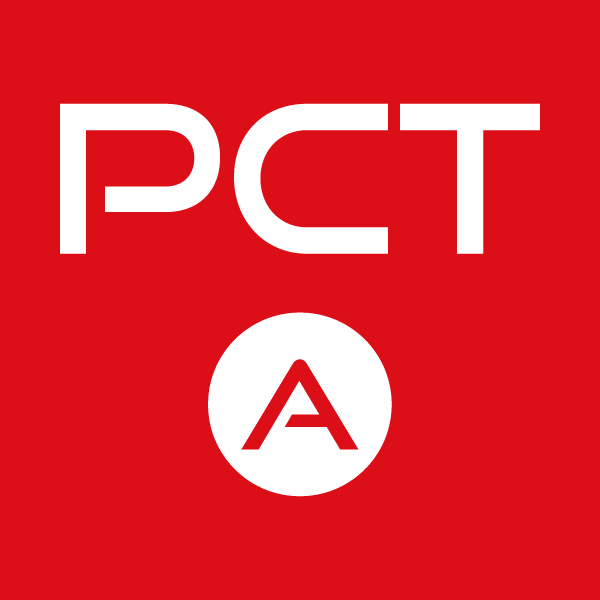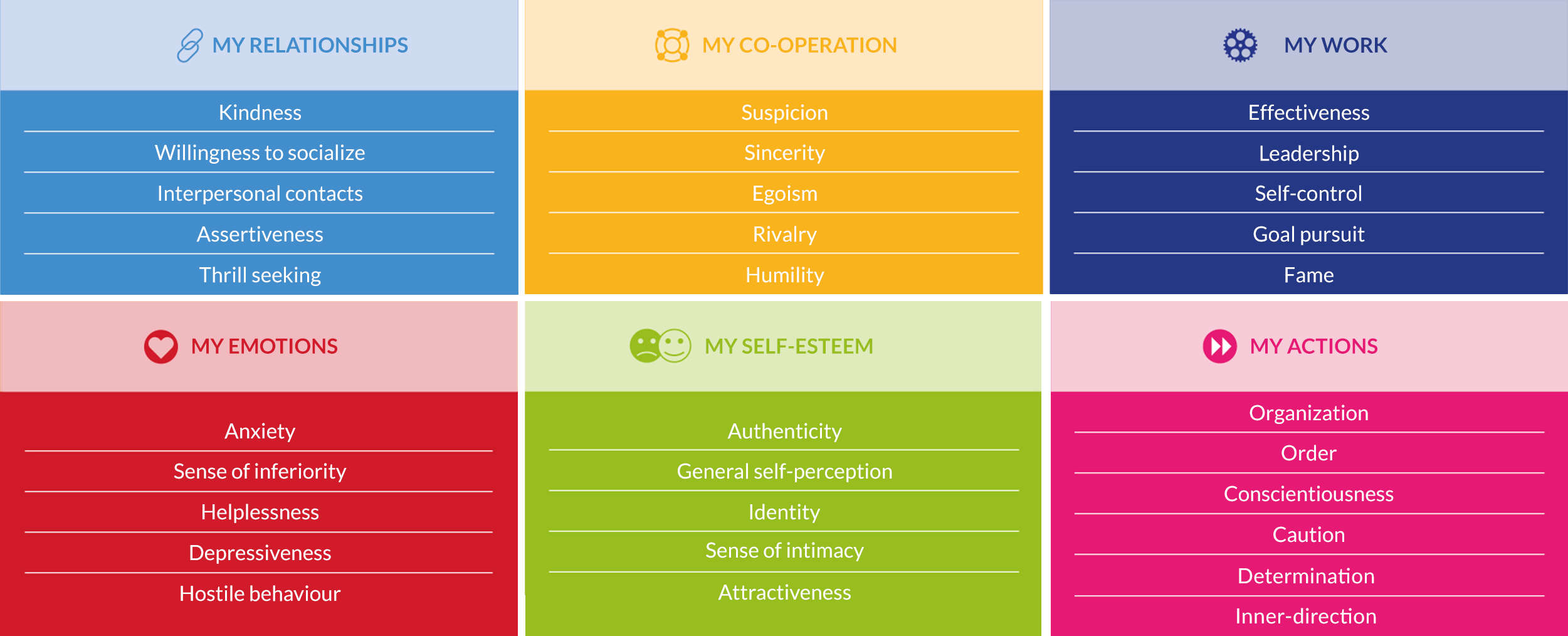
PCT-A - Profi Competence Test for Adults
PCT-A Test (Profi Competence Test for Adults) is the most complex test that examines the potential, self-assessment, emotions, strong sides and areas for development of an adult. It's a multidimensional tool used in personality assessment in relation to multiple areas of life, both private and professional.
PCT-A is a tool that supports the process of getting to know yourself and the process of professional development. It is recommended for building awareness of personal resources and during the construction of a career path.
The test is based on 6 dimensions and 31 subdimensions:

The test assesses the reactions, behaviours, attitudes, beliefs, strong sides and areas for development.
The comprehensive interpretation of results contains recommendations of specialists from various fields of expertise and supports the process of setting goals and making decisions at different stages of the subject's life.
- to build awareness of personal potential
- to determine strong sides and areas for development
- for diagnosis of developmental processes
- to establish professional preferences
- to establish an individual personal development plan
- to establish a path of professional development
- to make conscious decisions concerning changes in both private and professional life
- a model based on the Five Factor Model of Personality developed by Paul T. Costa, Jr. and Robert McCrae as well as Epstein's theory of personality.
- 340 questions with answers arranged on a scale of 0 to 4
- time for completion: about 60 minutes
- normalized tool
- an extremely detailed report (c. 50 pages) available in Polish and English
- report available immediately after submission of the test
Private individuals - in order to recognize their strengths and areas for development. Helpful in building awareness of one's own potential, aimed to examine one's professional, personal, interpersonal, leadership, teamwork and other predispositions. It determines, in a comprehensive way, one's self-assessment, attitude to work, cooperation, action, relationship building as well as it measures the level of selected emotions influencing effective functioning. It supports setting an individual direction of development.
Employees of companies and other institutions - to examine their professional, personal and interpersonal predispositions, leadership competences and teamwork. It is helpful at any stage of professional career to examine employees' competences, diagnose training and coaching needs or to determine the career paths. It determines, in a comprehensive manner, self-assessment, attitude to work, cooperation, action and relationship building, It also measures the level of selected emotions influencing effective functioning. It allows to diagnose not only employee behaviour and their potential, but also internal motivation, values and roles in the team.
HR departments - to diagnose the competences of employees, identify strengths and areas of development in order to change the scope of duties, position, promotion or define training needs. It determines, in a comprehensive way, self-assessment, attitude to work, cooperation, action, relationship building as well as measures the level of selected emotions influencing effective functioning.
Managers - to get to know their employees better. Helps to determine how to manage individual team members and the whole team. It determines, in a comprehensive way, self-assessment, attitude to work, cooperation, action, relationship building as well as measures the level of selected emotions influencing the effective functioning. It is helpful in the study of interpersonal relationships, leadership competences, action motivators, natural behaviour and the roles played in the team.
Recruiters - to get to know the candidates better. Helpful in choosing the best employees in terms of selected personality traits or competences. It determines, in a fully comprehensive way, self-assessment, attitude to work, cooperation, action, relationship building as well as measures the level of selected emotions influencing effective functioning.
Labour Offices - to diagnose Clients/Customers in terms of their strengths and areas for development, to identify key competences, examine the type of personality, personal and professional predispositions, barriers, limitations and beliefs. It defines, in a comprehensive way, self-assessment, attitude to work, cooperation, action, relationship building as well as it measures the level of selected emotions which influence effective functioning. It is helpful in the process of recruitment of the best candidates for the offered jobs.
Social Institutions - to diagnose Clients' strengths and areas for development, identify key competences, to examine the type of personality, personal and professional predispositions, barriers, limitations and beliefs. It defines, in a comprehensive manner, self-assessment, attitude to work, cooperation, action, relationship building as well as measures the level of selected emotions which influence effective functioning. It is helpful in the process of selecting the best candidates for specific activities.
Business coaches - for individual and group work as a tool supporting the training process. It is helpful in trainings within the area of communication, sales, customer service, managerial skills, teamwork, assertiveness, motivating, coping with emotions and difficult situations, conflict resolution, building own brand, building self-esteem, working on self-confidence, managing oneself in time, managing one's work as well as interpersonal and other trainings.
Psychologists -for individual and group work with patients. Helps to better understand the patient and establish a fuller, empathic contact with him/her. It determines, in a comprehensive way, self-assessment, attitude to work, cooperation, action, relationship building as well as it measures the level of selected emotions which influence effective functioning. It supports the process of diagnosis and therapy planning.
Coaches - for individual work (coaching sessions) and group coaching. Helps to get to know the Client. It determines, in a comprehensive way, self-assessment, attitude to work, cooperation, action, relationship building as well as measures the level of selected emotions which influence effective functioning. It helps to define coaching objectives.
Career counselor - for individual and group work. Allows to diagnose the personal and professional predispositions of the Client. It examines, in a comprehensive way, self-assessment, attitude to work, cooperation, action, relationship building as well as it measures the level of selected emotions which influence effective functioning. It is helpful in determining the career path.
PCT-A - a multidimensional questionnaire used to diagnose adult personality in the areas of emotions, self-esteem, co-operation, work, action and relationships.
Description: The questionnaire consists of 340 statements of a self-descriptive nature. Respondents assess if they agree with each statement on a five-point scale from "I completely disagree" through "I have no opinion" to "I completely agree". The questionnaire verifies six dimensions (scales) and 31 sub-dimensions (factors).
Reliability: Measured by Cronbach's alpha coefficient. Internal consistency coefficients for individual scales range from 0.72 to 0.83. The overall internal consistency coefficient is 0.95.
Relevance: Factor analysis was used to examine the relevance of the test. Six scales were determined and their empirical factor membership was established.
Normalisation: Sten scores were determined on the basis of a sample of 2016 individuals with different gender, age, place of residence and educational level. Norms were determined separately for men and women in three age groups.